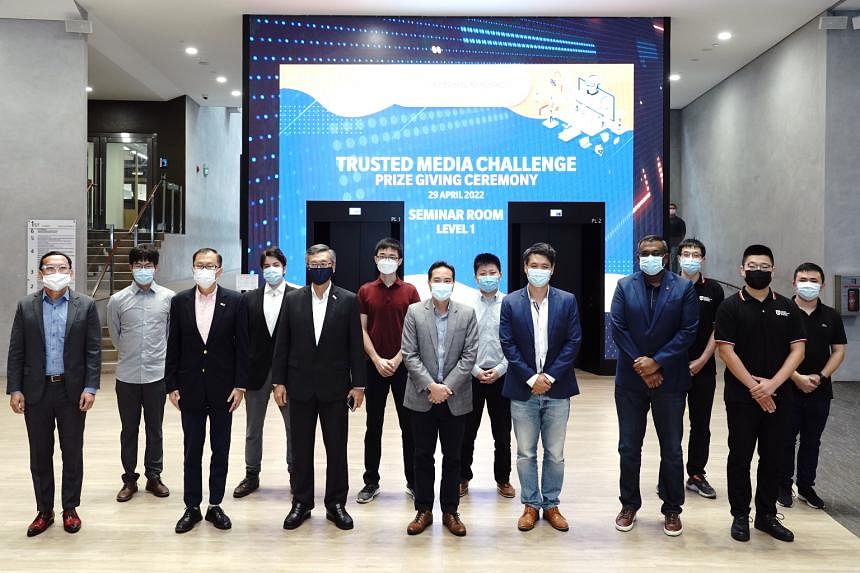SINGAPORE - A one-man team comprising Singaporean research scientist Wang Weimin beat 469 other teams from around the world in a five-month-long challenge to develop the best artificial intelligence (AI) model for detecting deepfakes, or digitally altered video clips.
Mr Wang's model was 98.53 per cent accurate at telling apart genuine clips from those that featured digitally manipulated faces, voices or both.
On Friday (April 29), the National University of Singapore graduate was awarded first place and a cash prize of $100,000 in the Trusted Media Challenge organised by AI Singapore, a national AI programme office under the National Research Foundation.
Mr Wang, who works at Chinese tech giant ByteDance, which owns TikTok, was also offered a $300,000 start-up grant to commercialise his invention. But he said he is hoping to incorporate his AI model into his company's BytePlus platform and offer deepfake detection as a service to its clients.
"Good or bad, deepfake is an emerging technology that you simply can't ignore," Mr Wang said, adding that he decided to take part because the prevailing challenges facing the media aligned with his research interests, and he has a strong interest in solving real-world problems by building AI products.
Deepfake technology uses AI to generate highly realistic images and audio that can be used to replace one person's likeness and voice with that of another person. It has been used not only to create entertainment content and Internet memes, but also in disinformation campaigns.
For instance, deepfake propaganda messages featuring altered footage of Ukrainian President Volodymyr Zelensky and Russian President Vladimir Putin have been spread online amid the Russia-Ukraine war.
Speaking at a prize presentation ceremony held at the NUS Institute of Data Science on Friday, Minister of State for Communications and Information Tan Kiat How said the challenge was timely, given the rising threat of deepfakes and their potential to spread misinformation.
He said: "Technology is not just part of the problem, it can also be part of the solution.
"However, technology cannot be the only solution to misinformation. It must be accompanied by a broader set of measures across society."
One such measure is to have a strong core of local media organisations that are trusted by their viewers and readers, Mr Tan said.
"Our local news media companies must play an important role as trusted interlocutors in this global marketplace of ideas, to inform and engage our citizens.
"They present an authoritative source of information for our citizens in an online space where it is sometimes unclear if a piece of information is true or false."
The challenge, which ran from July 15 to Dec 15 last year, was supported by local mainstream media outlets The Straits Times and Mediacorp's CNA, which contributed genuine video clips of news features and interviews featuring mostly Asian subjects to the training data set.
This differs from similar competitions held by American and European organisations, which tend to feature data sets with mostly Caucasian subjects.
Competition was stiff, with the teams that came in second and third both having developed AI models that were over 98 per cent accurate.
Swiss software engineer Peter Gronquist and Chinese PhD student Ren Yufan, both from the Image and Visual Representation Lab at the Swiss Federal Institute of Technology in Lausanne, took second place.
They were awarded a cash prize of $50,000 and offered a start-up grant of $150,000.
Mr Eugene Leow, head of digital media and strategy at SPH Media's English/Malay/Tamil Media Group, said SPH Media will work with Mr Gronquist and Mr Ren to develop their model further, with a view to exploring its applicability in newsroom operations like ST's.
Coming in third was a five-man team led by PhD student Li Tianlin of the Cyber Security Lab at Nanyang Technological University (NTU).
His teammates, all from China, comprised Mr Wang Jian, also a PhD student at the Cyber Security Lab; Mr Hou Yang, a PhD student at Japan's Kyushu University; Mr Guo Qing, a postdoctoral fellow at NTU; and Assistant Professor Xie Xiaofei of the Singapore Management University's School of Computing and Information Systems.
They won $25,000 in cash and a start-up grant of $75,000, which they will use to found a company called VAISION, named after Marvel Comics hero Vision.


